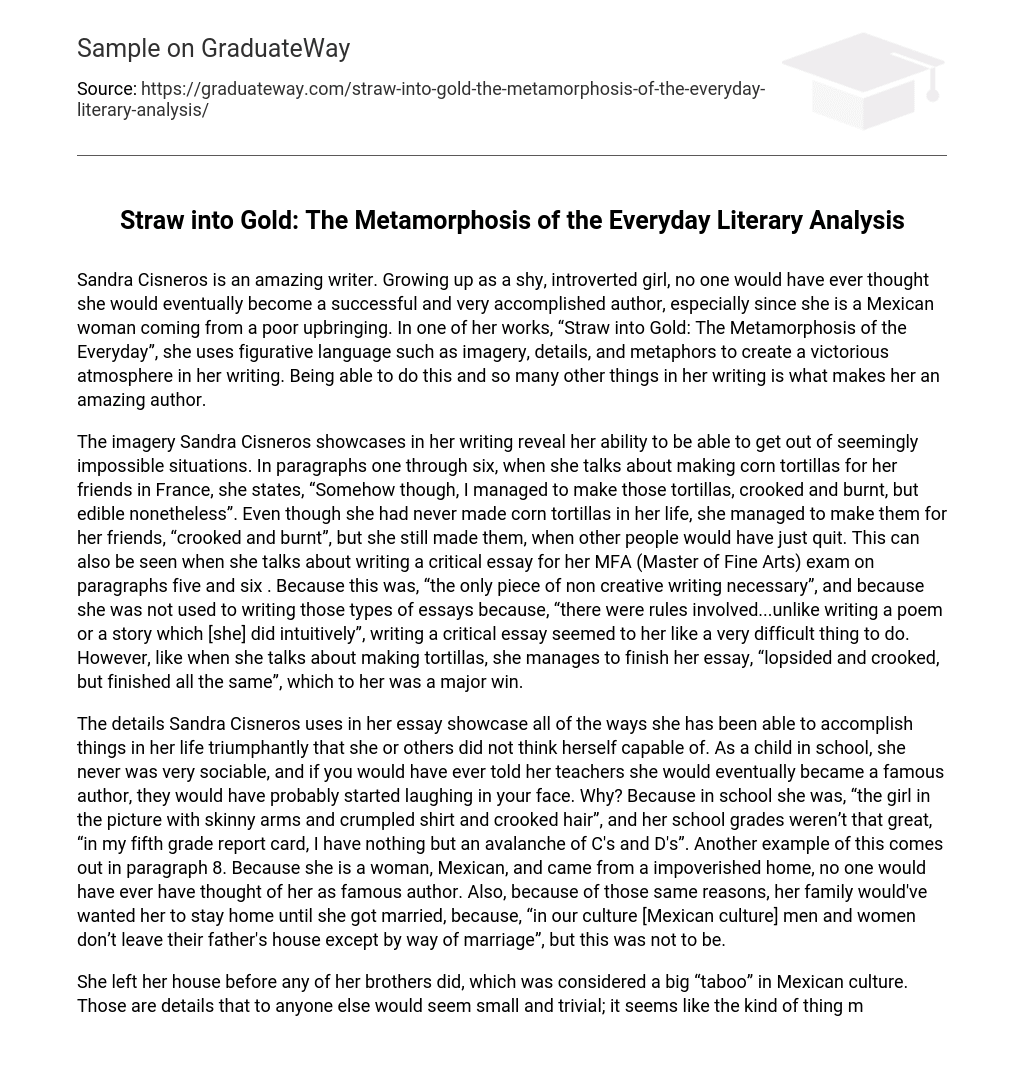Sandra Cisneros, an incredible writer, defied expectations to become a successful and accomplished author. Despite her shy, introverted nature and disadvantaged Mexican background, she has proven herself through her work, “Straw into Gold: The Metamorphosis of the Everyday.” In this piece, she skillfully employs figurative language, including imagery, details, and metaphors, to cultivate a triumphant ambiance within her writing. Her ability to accomplish this and other feats in her writing truly distinguishes her as an exceptional author.
Sandra Cisneros demonstrates her ability to overcome challenging situations through vivid imagery in her writing. In paragraphs one to six, she recounts the experience of making corn tortillas for her friends in France, remarking, “Somehow though, I managed to make those tortillas, crooked and burnt, but edible nonetheless.” Despite lacking prior experience in making tortillas, she persistently made them for her friends, even though they ended up imperfect. Most individuals would have given up, but she persisted. A similar example is found in paragraphs five and six where she discusses writing a critical essay for her MFA exam. Writing such an essay was challenging for her as it required following rules unlike the intuitive process of writing poems or stories. Nevertheless, she completed the essay, albeit imperfectly, describing it as “lopsided and crooked, but finished all the same,” which she considered a significant triumph.
Sandra Cisneros uses different details in her essay to show how she achieved numerous triumphs in her life despite doubts from herself and others. In school, she was introverted, lacked social skills, and did not conform to societal appearance standards. Because of this, if her teachers had known about her future success as a renowned author, they would have likely ridiculed the idea. This disbelief came from her underwhelming academic performance with mediocre grades like Cs and Ds on her report card. Another example that supports these misconceptions is found in paragraph 8 where it was unimaginable for someone of her gender, Mexican heritage, and impoverished upbringing to become a famous author. Moreover, due to these earlier mentioned circumstances, it was expected by her family that she would stay at home until marriage—a cultural norm for women in Mexico who usually only leave their paternal households through marriage. However, Cisneros challenged this convention.
Leaving her house before her brothers was considered unacceptable in Mexican culture. These details may seem insignificant to others, but they held great significance for her. This marked a turning point in Cisneros’ life. If she had obeyed her family and traditions and stayed, she would not have achieved her current success. However, her family now feels abandoned by her, particularly their father who becomes emotional when watching Mexican soap operas about children who have forsaken their parents. While this may not seem significant to us, it was a major decision for her – choosing between her own aspirations and the expectations of her family.
Sandra Cisneros employs metaphors in her essay to convey the challenging nature of certain situations in her life. In paragraph four, she utilizes the metaphor of “little armies of dough” to describe the tortillas. While one wouldn’t typically associate tortillas with an army, Cisneros likens the difficulty she faces when making tortillas to waging a war against the dough, thereby labeling it as an army. She perceives the act of making tortillas as if she is thrust into a battlefield without any prior experience, expected to triumph over her adversary within an hour – a highly improbable feat. Although this portrayal may be somewhat exaggerated, as a Mexican woman, Cisneros believes it is imperative for her to possess the skill of making tortillas.
Sandra Cisneros has triumphed over numerous challenges, demonstrating her resilience. In her essay, she employs imagery, details, and metaphors to illustrate her ability to overcome seemingly insurmountable situations, much like the princess in the tale “Rumpelstiltskin” who was confined in a room to transform straw into gold. By possessing the appropriate motivation and dedication, one can surmount any obstacle encountered. As she remarks in the concluding paragraph of her essay, “Throughout the journey, there has been an abundance of straw readily available. With a little imagination, it can be transformed into gold”.





